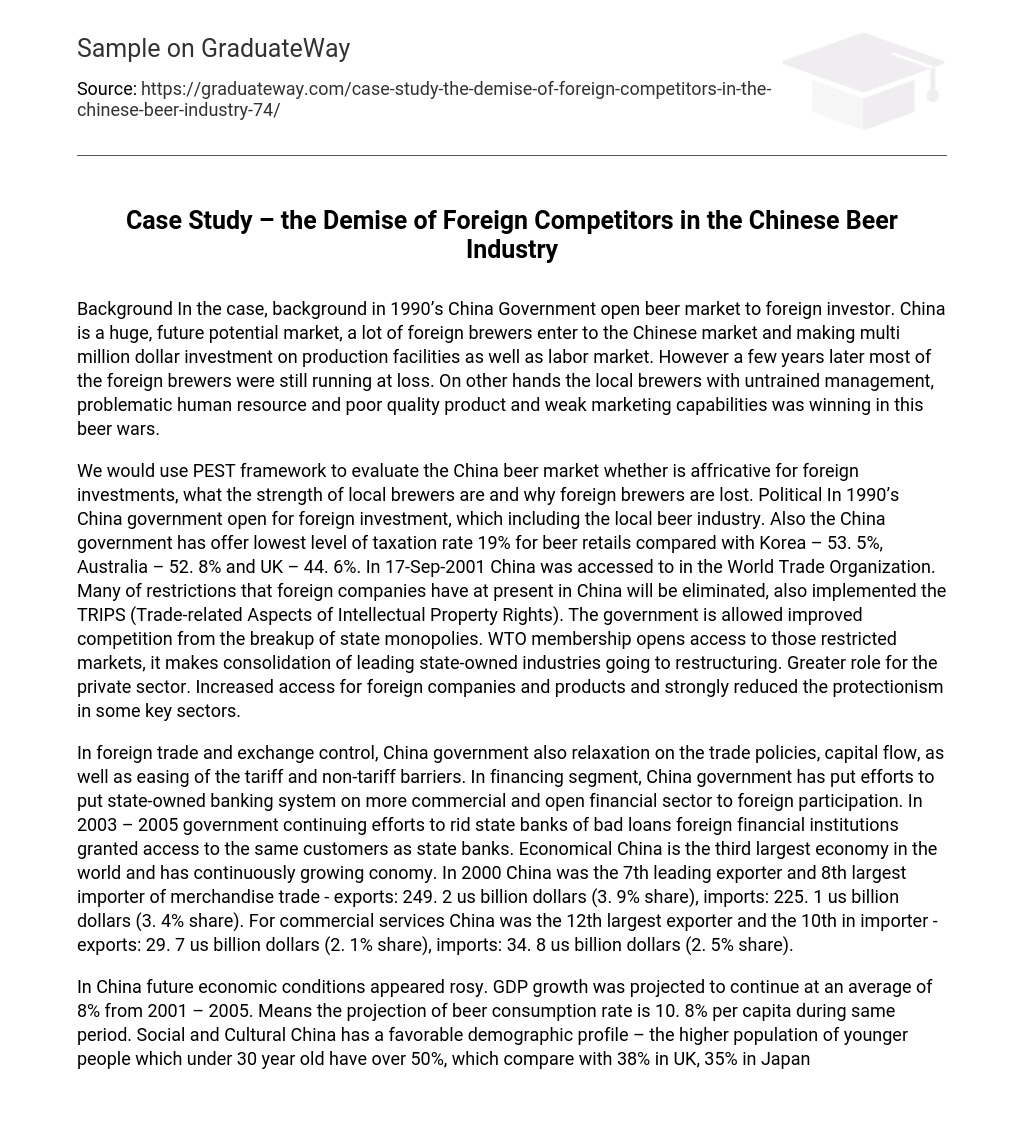Background In the case, background in 1990’s China Government open beer market to foreign investor. China is a huge, future potential market, a lot of foreign brewers enter to the Chinese market and making multi million dollar investment on production facilities as well as labor market. However a few years later most of the foreign brewers were still running at loss. On other hands the local brewers with untrained management, problematic human resource and poor quality product and weak marketing capabilities was winning in this beer wars.
We would use PEST framework to evaluate the China beer market whether is affricative for foreign investments, what the strength of local brewers are and why foreign brewers are lost. Political In 1990’s China government open for foreign investment, which including the local beer industry. Also the China government has offer lowest level of taxation rate 19% for beer retails compared with Korea – 53. 5%, Australia – 52. 8% and UK – 44. 6%. In 17-Sep-2001 China was accessed to in the World Trade Organization. Many of restrictions that foreign companies have at present in China will be eliminated, also implemented the TRIPS (Trade-related Aspects of Intellectual Property Rights). The government is allowed improved competition from the breakup of state monopolies. WTO membership opens access to those restricted markets, it makes consolidation of leading state-owned industries going to restructuring. Greater role for the private sector. Increased access for foreign companies and products and strongly reduced the protectionism in some key sectors.
In foreign trade and exchange control, China government also relaxation on the trade policies, capital flow, as well as easing of the tariff and non-tariff barriers. In financing segment, China government has put efforts to put state-owned banking system on more commercial and open financial sector to foreign participation. In 2003 – 2005 government continuing efforts to rid state banks of bad loans foreign financial institutions granted access to the same customers as state banks. Economical China is the third largest economy in the world and has continuously growing conomy. In 2000 China was the 7th leading exporter and 8th largest importer of merchandise trade – exports: 249. 2 us billion dollars (3. 9% share), imports: 225. 1 us billion dollars (3. 4% share). For commercial services China was the 12th largest exporter and the 10th in importer – exports: 29. 7 us billion dollars (2. 1% share), imports: 34. 8 us billion dollars (2. 5% share).
In China future economic conditions appeared rosy. GDP growth was projected to continue at an average of 8% from 2001 – 2005. Means the projection of beer consumption rate is 10. 8% per capita during same period. Social and Cultural China has a favorable demographic profile – the higher population of younger people which under 30 year old have over 50%, which compare with 38% in UK, 35% in Japan and 33% in Germany. Which indicated high beer consumption growth potential. Also the personality of Chinese people is collectivism and patriotism.
In this reason, “Guanxi” relationships and connection is one of important elements which foreign investor must be knew it. That is one of successful reason of South African Breweries and China Resources alliance. According to SAB’s managing director for Asia: “Our partners are the China experts. They have experience of doing business there. As a result they have amazing contacts that can cut the red tape surrounding many issues: they can bring their other commercial operations to bear in a number of areas, they have access to people, they know the market and understand the rate of change required.
We have been able to harness our knowledge of the beer industry with their knowledge of China and come up with an awesome team”2 As well as Li Giurong, the chairmen of Tsingtao, highlighted: “Chinese have a very strong sense of home place…If I live in a place, I want to drink my local brand…. I don’t go into a place and say ‘My Tsingtao beer is better than your beer. My quality is better than yours. So why don’t you drink me? ’”3 The labor market also is a consideration for the foreign investor, in 1990’s the labor force in China is large, but poorly skill, as well as unhygienic, unsafe operation practices and sloppy.
Technological In 1990’s weak infrastructure and vast distance is major problem in China. “Bass faced distribution problems caused by local protectionism. Refused licence to sell bottled beer in certain cities, the brewery has to focus on draft beer, despite the lack of on tap facilities. Even nature was against them – beside regular floods blocking road and rail, winter at -35C froze the beer in the draught piping. ”4 From the above settle, we can determine the technology and flood control is poor.
However, after China opens the beer industry, the foreign brewers has brought their advanced technology to China. Also China government has continued improving in all areas, and a number of major projects completed or nearing completion. Infrastructure remains inadequate for the size of country. Conclusion From the above evaluation, China is a potential and sustainable growth beer market with political stability, high GDP growth, young population led increase consumption, as well as low market share.
It can be determined China as attractive country for foreign direst investment. However, we found most failed brewers, which have not understand the local situation and Chinese culture when they are make an investment in China, such as the personality of Chinese consumer, expenditure availability “no factor contributes more heavily to local brewer dominance…. than pricing”5 Also Chinese people have strong patriotic feelings attached, which potentially meant that global beer brands could remain nothing more than passing curiosity. Guanxi” in important elements for those two successful cases – Tsangtao Beer and South African Breweries, have alliance with a local brewers.





